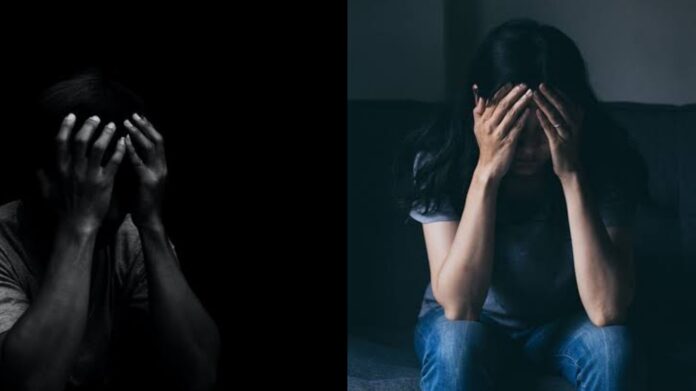This week, I read about the passing away of former Chief Executive Officer of Konga, one of Nigeria’s e-commerce giants, Nick Imudia. Imudia was said to have died by jumping from the balcony of his apartment in the Lekki area of Lagos State on the evening of Tuesday, June 25, 2024.
Before his death, the businessman reportedly made a call to his brother in the US to give him instructions on how to distribute his wealth and called his young daughter to inform her that he would always be there for her.
Reading about his death brought back the feelings of sadness that I had buried deep within the vortex of my mind.
It started with a phone call on a lazy weekend morning, many months ago.
Her voice was clogged with tears, the way it is when one has cried themselves hoarse. It cracked and shook with so much intensity and pain that I wished I could fly the thousands of miles between us so that I could envelope her in a tight hug.
Her husband of ten years had died. He had overdosed on a bottle of what she assumed to be sleeping pills and died while lying next to her. When he did not wake up for Fajr, she assumed it was because he was exhausted and so she allowed him to sleep a little longer. Living in the west, she admitted, had made them a bit lax in prayer.
When he did not wake up around 9am, after the kids had left for school, she decided to wake him up herself. The room was awfully silent and his lifeless body, motionless on the bed. For the first time, she noticed the awkward angle of his mouth and the uncomfortable posture of his back. At that moment, even before calling 911, she knew.
They say hindsight is 20/20.
In her hoarse voice, she told me about his many offhand remarks. ‘I wish I would just die’. Sometimes, when they watched the local evening news and an accident was reported, he would say casually: ‘The man who died is lucky. His problems are over’. In those moments, she would laugh it off and tease him about becoming westernized. ‘You are becoming like your white friends’.
Other time he told her that he wished he’d get hit by a bus. That way, his death wouldn’t be anyone’s fault. Again, she wrote it off as a deadpan expression of the common frustrations with daily life. They had their problems, she confided, but they were nothing out of the ordinary. Money issues: debt, mortgage and the likes. They sometimes quarrelled about the kids, but again it was nothing serious. She always thought they would grow old together.
She told people back at home that he died of a cardiac arrest in his sleep.
‘A cardiac arrest? At his age??’ they queried.
However, her troubles had only just began. The aftermath of a suicide – of any trauma – often gives way to a new reality, one that doesn’t fit with what came before it. After his death, everything felt heavier. My friend was consumed by many emotions: anger, sadness and insurmountable guilt. She felt it was her fault. Then, she would feel narcissistic and ashamed for focusing on that instead of mourning her husband’s death, which would, in turn, make her contemplate the finality of his death and the reality that she’d never see him again, and that would lead her right back to thinking that it was all her fault.
But there was more to come. People rarely take kindly to the partner of someone who died by suicide; they easily slide into the role of the most logical scapegoat. Neighbours who had heard rumours looked at her funny. Her husband’s friends and co-workers who knew about his mental health struggles gave her pitying looks. One even burst into tears when she ran into him at the grocery store. When people from Nigeria called, she was weighed down by the lies she told. What purpose would it serve to tell his mother that her son took his own life? His mother spoke in glowing terms of her darling, selfless son and my friend had to bite her tongue to keep herself from lashing out the truth- that he had put himself first, before his wife and children and left her drowning in thousands of dollars in debt. That her job could not provide enough for her and two children. That she had borrowed a huge amount to bury him according to Islamic rites in the US because the Muslim community had been wary about the manner of his death. That she was contemplating returning to Nigeria. That she cried herself to sleep most nights.
My role was to act as a listening ear. No one wants to talk about suicide. It’s prickly and sensitive and makes people uncomfortable. There is so much stigma attached, so much judgement. Before this happened to my friend, I viewed it that way too: tremendous pity for the people involved, but a deep discomfort when confronted with it.
Our culture and religion prohibit speaking ill of the dead. We have weak spots for the deceased. We want to honour them, respect them, and love them. Suicide complicates that. People who die by suicide are both the victim and the perpetrator of their own death – a difficult paradox to reconcile. Even as a doctor, and knowing what I do about mental health, it is still a difficult concept to fathom.
Over the years, I have heard of many patients or people who have taken their lives, but none resonated like that of my friend’s husband. Like her, I was both angry and sad. Angry at her for burdening me with a secret and sad for the emotions she was going through.
Every year close to 800,000 people take their own life and there are many more people who attempt suicide. Every suicide is a tragedy that affects families, communities and entire countries and has long-lasting effects on the people left behind. Contrary to what we previously thought, suicide does not just occur in high-income countries, but is a global phenomenon in all regions of the world. In fact, over 78% of global suicides occurred in low- and middle-income countries in 2015.
While the link between suicide and mental disorders (in particular, depression and alcohol use disorders) is well established in high-income countries, many suicides happen impulsively in moments of crisis with a breakdown in the ability to deal with life stresses, such as financial problems, relationship break-up or chronic pain and illness. In addition, experiencing conflict, disaster, violence, abuse, or loss and a sense of isolation are strongly associated with suicidal behaviour.
The African region is home to six of the 10 countries with the highest suicide rates worldwide. The common means of suicide in the region are hanging and pesticide self-poisoning and to a lesser extent drowning, use of a firearm, jumping from a height or medication overdose. Studies show that in Africa for each completed suicide, there are an estimated 20 attempted ones.
And yet, we do not want to address the issue.
We would rather cover up with lies about a person’s death. We call them accidents or sudden deaths or dying while sleeping. Over the years I have learnt to be wary of news of sudden deaths. Many people are living with truths too heavy to bear.
We need to wake up to this reality so that we can help people around us. Everyone has a part to play: family, neighbours, friends. Usually, people who are on the brink of suicide give warning signs: frequent talks of dying as a means of escape, mood changes (long bouts of sadness), excessive crying, giving things away, feelings of hopelessness etc. Let us keep tabs on our loved ones and refer them appropriately to hospitals, counsellors and even religious clerics.
From my friend I learnt that the burden of suicide and its aftermath lies mostly on the family of the deceased.
Let us learn to recognise cries for help.





